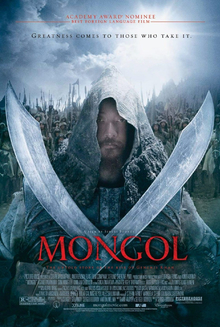"Mongols need laws.
I will make them obey...
...even if I have to kill half of them."
Also known as "Mongol: The Rise of Genghis Khan", "Mongol" unsurprisingly covers the early life and rise to power of Genghis Khan (under his given name Temüüjin), who conquered the largest land empire in history. The story begins with 9-year-old Temüjin on a trip by his father Yesugei, a Mongol chieftain, to select a girl as his future wife.
Although his father wishes him to choose someone from the rival Merkit tribe in order to make peace, along the way Temüjin meets Börte, a girl from another tribe. Impressed with Börte's pluck, he picks her instead. Shortly thereafter, disaster strikes when Yesugei is poisoned by another group of rivals.
This begins a sequence when Temüjin is periodically on the run and captured. During this time, he becomes blood brothers with another young boy named Jamukha and Börte gives birth to two children of questionable parentage. Eventually, Temüjin raises an army to unify all of the Mongols, and meets his blood brother, now a powerful warlord in his own right, for a final showdown.
While Genghis Khan is the national hero of Mongolia (where he is still revered to the present day), his reputation in other parts of the world is... mixed. However, rather than portray Temüüjin as a cartoon villain or sociopathic mass murderer, director Sergei Bodrov instills sympathy and humanity, which is easier since the film depicts the period prior to Genghis Khan's major genocides and atrocities.
Although his father wishes him to choose someone from the rival Merkit tribe in order to make peace, along the way Temüjin meets Börte, a girl from another tribe. Impressed with Börte's pluck, he picks her instead. Shortly thereafter, disaster strikes when Yesugei is poisoned by another group of rivals.
This begins a sequence when Temüjin is periodically on the run and captured. During this time, he becomes blood brothers with another young boy named Jamukha and Börte gives birth to two children of questionable parentage. Eventually, Temüjin raises an army to unify all of the Mongols, and meets his blood brother, now a powerful warlord in his own right, for a final showdown.
While Genghis Khan is the national hero of Mongolia (where he is still revered to the present day), his reputation in other parts of the world is... mixed. However, rather than portray Temüüjin as a cartoon villain or sociopathic mass murderer, director Sergei Bodrov instills sympathy and humanity, which is easier since the film depicts the period prior to Genghis Khan's major genocides and atrocities.
In any event, "Mongol" is a sweeping epic historical film, with beautiful cinematography, stunning landscapes, and powerful battle scenes. There's plenty of carnage but the film is also balances with quiet character moments that give a sense of Temüüjin as a person and family man.
Blending action, politics, romance, and brotherhood, "Mongol" is both a grand and an intimate movie that is successfully both entertaining and dramatic.
Blending action, politics, romance, and brotherhood, "Mongol" is both a grand and an intimate movie that is successfully both entertaining and dramatic.



No comments:
Post a Comment